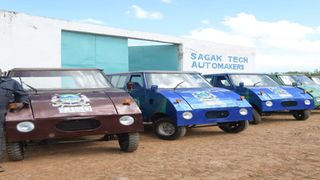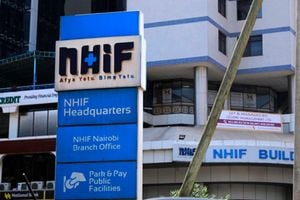
The BJ-50 vehicles manufactured in Laikipia.
| File | James Murimi | Nation Media GroupLaikipia
Premium
Laikipia's popular BJ50 Tuk-tuks now rotting away
The Laikipia tuk-tuk dream is on its deathbed.
When the Nation visited the project’s mini factory tucked in the heart of Jua Kali area, about a kilometre from the Nyahururu town, we found the workshop’s main entrance locked.
Meanwhile, the six four-wheel units, also known as BJ50, that wowed the nation when they were unveiled in 2019 are gathering dust at the main garage in Nyahururu town.
The factory that once employed hundreds of youth from the region has been abandoned and when you enter, you are greeted by dust, scrap metal, spiders, cobwebs and colonies of fleas.

The BJ50 Rickshaw, from Sagak Tech Automakers.
The now grounded automobiles were the brainchild of Samwel Gatonye—a self-trained innovator, whose project was being supported by the County Government of Laikipia, under the leadership of former Governor Ndiritu Muriithi.
Until 2019, Gatonye was working in a small garage in Nyahururu town. He shot to the limelight and grabbed newspaper headlines in 2020 when the county government, in partnership with a group of local businesspeople, registered a company to start mass production of the vehicles.
The company was registered under the name Sagak Technology Automakers and Gatonye was the majority shareholder. He later received a stamp of approval from the Kenya Bureau of Standards (Kebs), certifying that his machines met the set standards, before opening the factory.

The BJ-50 vehicles garage in Laikipia.
Kebs also gave the company the go-ahead to start mass production of the vehicles that could move at a maximum speed of 70 kilometres per hour and could ferry six passengers and 800 kilogramme of cargo at ago.
In a letter, Kebs said that the two units that were inspected by the chief mechanical and transport engineer complied with all the applicable requirements set out in the evaluation criteria.
The company manufactured six units that underwent vehicle tests and inspections by the chief mechanical engineer for six months.
Some of the areas that Kebs had scrutinised included the design, proper use of certified spare parts, and road testing.
Later, six units of the tuk-tuk were registered and acquired KG number plates that are short-term dealership garage plates with a special insurance cover for vehicles awaiting number plates or without insurance.

Former Laikipia Governor Ndiritu Muriithi (right) admires a locally-made tuk tuk, in Nyahururu on June 7, 2019.
Nation.Africa caught up with Gatonye who is currently a farmer at his Mairo Inya home on the outskirts of Nyahururu town. “That is how l pay my bills, including school fees for my children," he said.
He revealed that his plans to manufacture the tuk-tuks in large numbers hit a snag after the current county administration developed cold feet.
“We stopped our operations after the last general election. Though we had full support from the former county and national government, we had to halt our operations temporarily as we await a nod from the current government,” he said.
The freezing of the project left the innovator and his staff in limbo because some buyers had already made their orders and are waiting for deliveries to date.
“There were orders worth Sh2.2 million that are yet to be delivered. The company is in debt and has requested clients to be patient as we raise additional capital and get a way forward from the new county leadership,” he said.
“They (the vehicles) were not fully furnished and therefore we could not release them to the market. More is needed to facilitate the full realization of the dream of assembling our own vehicles as a country,” he added as he called on the two levels of government to support the project.
But to get back into business, the innovator may have to start afresh since the staff who once worked for his company left after operations stopped. Some contracts such as security, rent and lease had to be terminated due to lack of money.

The BJ50 Rickshaw, from Sagak Tech Automakers.
"Some of those I was working with at the factory returned to work in garages in Nyahururu to fend for their families. The county administration has been promising us that it is still evaluating the project and we are waiting for them to give us a way forward.”
The self-effacing innovator still believes that his dream was only deferred and will come to fruition one day.
"I was able to show our young men and women that every dream is valid. My dream of innovating a locally made automobile became a reality. l am confident that it is a matter of time before my dream fully materialises,” he said.
"The truth is that we might not be in operation at the moment but my dream is still alive. My hope and wish is that one day Kenyans will come to embrace their own brands."
The automobile, which is powered by a 150cc motorcycle engine to reduce fuel consumption, was to sell at Sh450,000 apiece.
“An ordinary tuk-tuk has a speed limit of 70 kilometres per hour and the BJ-50 is no different, except that it can comfortably carry seven passengers. Ordinary tuk-tuks carry a total of five passengers,” he stated.
Nation.Africa has since established that the current Laikipia Governor Joshua Irungu’s administration put breaks on the project to first evaluate it, before it could pump resources into it.
“The county government has not abandoned the project. We are still evaluating the project before we give advice on the way forward,” said Stephen Kisorio, the Laikipia County Trade, Cooperatives, Tourism and Enterprise executive.
Wallace Nderitu, the Sagak Tech Chief Operating officer, said the county government is a major shareholder in the company and things will change once it is back on board.
“With the support from the government, the factory can create over 1,000 job opportunities directly for our youth,” he said.
He called on both county and national government to support local innovators.
“There is need for the county and the national governments to support innovators in strategy development, advise on staffing, marketing strategy development and implementation support, marketing, book keeping, branding, human resource management, taxation among other things.”
For Gatonye, Governor Irungu and his administration hold the key to the innovator’s tuk-tuk ride in the local and regional market.




